Module_6_Unit_2what_does_lingling_have_at_school(1)
外研版英语九年级上册Module 6 Problems Unit 2 课后训练

Module 6 Problems Unit2Ⅰ.根据句意及首字母或汉语提示完成句子1.If your watch is broken, please ask Mr Wang to r it for you.2.The boy knew that he was wrong, so he a to his parents.3.If you offer to buy him a new watch, he’ll r that you’re really sorry.4. Daming is such an (诚实的) boy that we all like him.5.Kate, please give the (原因) why you were late again.Ⅱ.用所给单词的适当形式填空6.If she (run) every day, she (be) much stronger.7.I didn’t know why he refused (lend) his book to me.8.My parents have warned me (not drive) after drinking.9.I didn’t have enough pocket money (buy) a new flat.10.Have you decided where (go) on vacation?11.If you finish (read) the book, give it back to me.Ⅲ.根据汉语意思完成句子12.孩子们从父母那里得到了一些零花钱。
The children have got some from their parents.13.汤姆想要把这个游戏从电脑上删除。
Tom wants to the game the computer.14.我的电脑坏了,我不知道怎样修理它。
My computer is broken. I don’t know it.15.不要生他的气。
三年级下册Module6 Unit2 What does Lingling have at school外研版三起(含答案及解析)

三年级下册Module6 Unit2 What does Lingling have at school外研版三起(含答案及解析)一、单选题(共18题)1.—Does Xiaoyong like basketball?—.A.No, he don'tB.Yes, he doesC.Yes, he do2.—What does Lingling at school today?—She Maths, English and Chinese.A.has; hasB.have; haveC.have; hasD.has; have3.hat⇨ ha____A.sB.b4.My brother ________ Music on Mondays.A.haveB.playC.has5.Amy ________ basketball and she ________ skipping, too.A.play; goesB.plays; goC.plays; goes6.—________________—I go swimming.A.What do you do in the morning?B.What do you have in the morning?7.I have in the afternoon.A.Music, art and PEB.Maths and Art ,PEC.Maths, Art and PE8.想知道朋友周一是否去游泳,可以这样问:A.Do you go swimming on Mondays?B.Do you go to school on Mondays?9. 找出不同类的一项A.todayB.MondayC.Sunday10. 找出不同类的一项A.inB.onC.an11.—__________________—No,I don't.A.Do you go to school on Sundays?B.What do you do on Mondays?12.朋友问你:“What does Tom do on Sundays?”,你可以说:A.She has English.B.He watches TV.13. 找出不同类的一项A.goB.hasC.does14.What________ Lingling have in the morning?A.doB.doesC.is15.—______________________—I have Maths today.A.What does he do at school today?B.What do you have at school today?16.—______________—Yes, I do.A.Do you play football on Mondays?B.Does she play football on Mondays?17.我们今天上午有音乐课,可以说:A.We have Music in the morning today.B.We have Maths in the morning today.18. 找出不同类的一项A.haveB.doC.class二、填空题(共2题)19.给下列图片选择相应的课程单词A. MusicB. EnglishC. PED. MathsE. Art ________________________________________20.看图片,选一选A. B. C.D. E.⑴on Monday ________⑵on Sunday ________⑶in the morning ________⑷in the afternoon ________⑸have Music ________答案部分第 1 题:【答案】B【考点】一般现在时,疑问句【解析】【分析】句意:——小勇喜欢打篮球吗?——……问句为一般疑问句,肯定回答: Yes,主语+does. 否定回答: No,主语+doesn't. 回答时用代词代替问句中的人名,事物等。
外研版(三起)-英语-三年级下册--Module 6 Unit 1 What do you do on Sundays- 教案

【新课堂】模块6 Unit 1模块内容导读新课导学亲爱的小朋友,你喜欢学校里丰富多彩的生活吗?周一到周五,你在学校里都学习什么课程呢?周末你又会参加什么有意义的活动呢?你想不想流利地用英语表达这些内容呢?快跟我一起走进今天的英语课堂吧!学完本模块相信你一定会学到新的本领。
语法索引UIut l(第一单元)1.一般现在时简介(一) (105)2.询问对方在某一时间做某事的句型………… …一(105)3.and的用法…… …一(108)4.在上午、下午的表达 (108)5.不同的“看”…… …一(109)Unit 2(第二单元)6.have和class的用法 (112)7.辨析:lesson和class (112)8.时间和地点在句中的位置 (115)9.in the morning在句中的位置 (115)10.-般现在时简介(二) (115)模块目标预览学前必备知识目标语音字母Ll在单词中发/1/,字母Mm在单词中发/m/,字母Nn在单词中发/n/词汇同学们,下列词汇要求你们能听懂、会说、会读,会写,你们能做到吗?单词do(做),Sunday(周日),eat(吃),in(在……期间),watch(观看),have(上……课),class(课),Chinese(语文,汉语),Maths<数学),Science(科学),sleep(睡觉),today (今天),Music(音乐),Art(美术),PE(体育)短语at school(在学校),on Sundays(在周日),play football(踢足球),play basketball (打球),watch TV(看电视),in the morning(在早上),in the afternoon(在下午) 知识目标同学们,下列词汇要求你们能听懂、会说、会读,你们能做到吗?单词timetable(时间表),pupil(小学生)短语make a timetable(制作时间表)句型同学们,下列句型要求你们能听懂、会说、会读,会写,你们能做到吗?1.询问对方或他人在学校上什么课并回答。
小学五年级英语【外研版】上册教学课件-【Module 6 Unit 2】

2 Listen and read.
This is Amy’s grandpa. In the past, he ran very 在过去 fast. He jumped high an(d) swam very fast.
慢的 He’s slow now,
but healthy! 健康的
Watch the video and read again.
Summary
1. Key words: swim swam; slow; healthy 2. Key sentences:
In the past, he ran very fast./... He’s slow now./... It can run fast/jump high/...
Exercise
Can she swim fast?
✓ Yes, she can. × No, she can’t. swim fast
in the past 过去
now 现在
I swam slowly.
I can swim fast .
慢的
swim的过去式(游泳)
He’s old but he’s healthy.
6 Do and say.
She can say it very well.
She sells 海贝,贝壳 seashells at the seashore. 海岸
Let’s guess.
He cooks food in a restaurant.
He can cook very well.
He helps the sick people (病人) in the hospital.
Module 6
外研社版小学英语 (三年级起点)三年级下册Module 6-7-8-9 电子课本+课文朗读

三年级下册Module 6 电子课本+课文朗读电子课本重点单词短语do [du] 做Sunday [ˈsʌndeɪ] 星期日swimming [ˈswɪmɪŋ] 游泳(运动) go swimming 去游泳eat [i:t] 吃in [ɪn] 在……期间,在……时候sleep [sli:p] 睡觉watch [wɒtʃ] 观看TV 电视节目watch TV 看电视have [həv] 做;进行,从事class [klɑ:s] 课;班级today [təˈdeɪ] 今天music [ˈmju:zɪk] 音乐has [həz] (have的第三人称单数形式)做;进行,从事Chinese [ˌtʃaɪˈni:z] 语文,汉语maths [mæθs] 数学art [ɑ:t] 美术PE=physical education[ˈfɪzɪkl] [ˌedʒuˈkeɪʃn] 体育science [ˈsaɪəns] 科学重点内容第六模块一、重点单词:do 做,干Sunday 星期日swimming 游泳(运动)go swimming 去游泳eat 吃in 在……期间,在……时候sleep 睡觉watch 观看TV 电视节目watch TV 看电视have 做;进行,从事class 课;班级today 今天music 音乐has (have的第三人称单数形式)做;进行,从事Chinese 语文,汉语maths 数学art 美术PE=physical education 体育science 科学二、重点句型:1. A: What do you do on Sundays? 你星期日做什么?B: I go swimming\watch TV\sleep.我去游泳\看电视\睡觉。
2. A: What do you do in the morning\afternoon?你早晨\下午做什么?B: I go swimming\play football\watch TV\sleep in the morning\afternoon.我早晨\下午去游泳\踢足球\看电视\睡觉。
八年级英语Module_6_hobbies-unit2

Climbing is one of my hobbies. It's very interestingr.
2.课堂作业
climbing dancing growing vegetables looking after animals
braver,stronger,more careful fitter, more patient and careful kinder,gentle,more patient
3 When did David become a successful writer? When his book came out in 2012. 2 What hobbies does David have? David likes writing and playing volleyball and many other things. 4 Will David's new books be successful? Maybe. The passage doesn't say .
1. 在菜园里种菜
检查预习完成情况
guess ! what hobby and take about your hobbies
climbing
playing volleyball
writing
sailing
looking after animals
mountain biking
growing vegetables
他的其中之一爱好是写作
• As a result, David has become a successful young writer. 结果,David 成为一名成功的年轻作家。 • His hobby has brought him pleasure and success 他的爱好给他带来了快乐和成功 • He is also interested in many other things. 他也对许多事情感兴趣 • I like playing volleyball too. 他也喜欢打排球 • I spend some of my free time playing volleyball for my school team 我用我的一部分业余时间在校队打球 • Maybe I'll write about my volleyball team in my future books. 也许我将来的书中会写一写我的排球队 • There was a writing class. 有一门写作课
三下 M6U1__What_do_you_do_on_Sundays

播放第三遍课文录音,注意模仿录音的语音语调,教师纠正。
学习“in the morning”,”in the afternoon”时,列举morning 和afternoon 这两个 时间段的时间,向学生说明时间段的概念。
利用课文动画情境学习Sunday ,sleep, watch TV时,教师展示图片帮助学生理 解。
在日常交际中初 步注意到中外文 化的异同
语言技能目标
学习策略
文化意识
情感态度
积极 运用所 学英语进行 表达和交流
说教材 语言知识目标
1.功能:谈论周末活动安排和学校课程。
2.语法: what do you do on Sundays? What does Lingling have at school? I have… she has Chinese/Maths… 3.词汇:do, Sunday, swimming, go swimming, eat, in, sleep, watch, TV, watch TV, have,class, today, music has,Chinese, maths,art, PE 4.语音:感知包含实意动词的特殊疑问句的语音语调。
1.当小狗遇到小猫会发生什么是呢?播放课文动画,让学生 在问题中观看动画。 2.再次播放课文动画,请学生边指图边跟读,然后全班跟读, 小组跟读,个人跟读。
3.分角色表演read in roles
在本模块中我们将继续学习如何介绍自己在星期日的活动安 排并询问他人的活动安排。现在我们先听听Sam 和Dalin之 间的对话吧。 播放课文录音请学生边看图边仔细听课文对话。 播放第二遍录音,回答问题: Questions: 1. What does Sam do on Sundays? 2. What does Sam do in the morning? 3. What does DaLin do on Sundays?
科普版小学英语四年级下册教案5篇
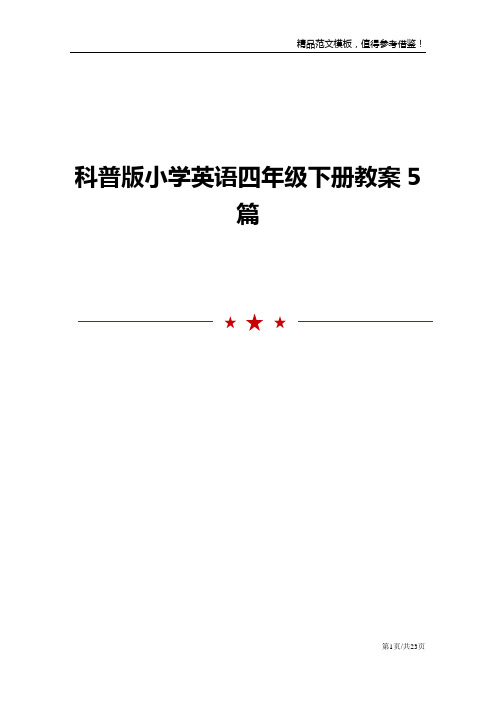
科普版小学英语四年级下册教案5篇科普版小学英语四年级下册教案5篇教案是教师为顺利而有效地开展教学活动,根据课程标准,教学大纲和教科书要求及学生的实际情况,以课时或课题为单位,对教学内容、教学步骤、教学方法等进行的具体设计和安排的一种实用性教学文书。
以下是带来的科普版小学英语四年级下册教案内容,感谢您的阅读,希望能帮助到您!科普版小学英语四年级下册教案1通过上个学期的学习,学生们对英语已经有了一定的了解,并掌握了一些日常对话用语和一定量的词汇。
三班大多数的孩子对英语学习有浓厚的学习兴趣而且上学期打好了英语学习的基础。
但是仍然有一部分学生对学习英语有一定的困难,需要本学期来加强学习英语的能力,同时本学期应该在课堂上加强学生的英语口头表达能力和自主学习的能力,以增强孩子们的综合语言运用能力。
Module 1Unit1 It’s the ABC song Unit2 Alphabet主要学习字母的读音以及正确的书写方式。
Module2Unit1 They are monkeys Unit2 That man is short.询问这是什么。
并且学会描述物体的特点。
Module3 Unit1I like football Unit2 I don’t like riding my bike.学会描述自己的喜好。
Module4 Unit1 Do youlike meat? Unit2 Does Lingling like orange? 学会询问别人的喜好。
Module5 Unit1 She goes toschool on Mondays.Unit2 Does your mum go to work onSaturday?学会谈论家庭成员的日常活动。
Module6 Unit1 What do you do on Sunday? Unit2 What doesLingling have at school?谈论周末活动安排和学校课程。
Module6-Unit-2-I-haven't-got-a-book-about-the-US课件

Miss Lin,my Art teacher, helped me make a poster of New York with those photos.
3.When does your school start and finish,Lingling?
The head
Thank you for your letter.I’m happy to be your pen friend.
I haven’t got a book TabhoauntkthyeoUuSf.Borut..I..h..ave got some photos of New York.Daming sent them to me.Miss Lin,my Art teacher,
The Empire State Building
the UN building 联合国大厦
U:United 联合的 N:Nations 国家
The UN wants to make peace in the world.
和平
Statue of Liberty自由女神像
2.Who helped Lingling make a poster of New York?
Module 6 Unit 2 I haven’t got a book about the US.
(1) 在看、听、说的活动中,学会在语境中运用表示自己或 他 人 没 有 此 物 , 但 有 彼 物 的 句 型 : I haven't got a book about the US,but I’ve got…
1.What have you got,Lingling?
Module6Unit2课件2021-2022学年外研版英语八年级上册

Pandas live in Southwest China. They are in danger and the situation is getting very difficult. First, pandas don’t have many babies, and baby pandas often die. Second, pandas eat bamboo, but the bamboo forests are getting smaller. So the government is setting up nature parks with a lot of bamboo to help protect pandas.
WWF. T
3. The WWF is working hard to save tigers, elephants and any other animals in danger.
1. Scientists do a lot of research _t_o_h_e_l_p__p_a_n_d_a_s_t_o_p_r_o_d_u_c_e__m_o_r_e__b_a_b_ie_s___ _a_n_d__h_e_lp__b_a_b_y__p_a_n_d_a_s_l_i_v_e____________.
2. The government is setting up nature parks t_o__p_r_o_te_c_t_p_a_n_d__a_s_in__t_h_e_w__il_d_.
3. The WWF chose the panda t_o_b__e_i_ts_s_y_m__b_o_l.
4. The WWF is working hard t_o__sa_v_e__a_ll_t_h_e_a_n__im__a_ls__________.
外研版八年级英语下册 module6 unit2教案 (1)
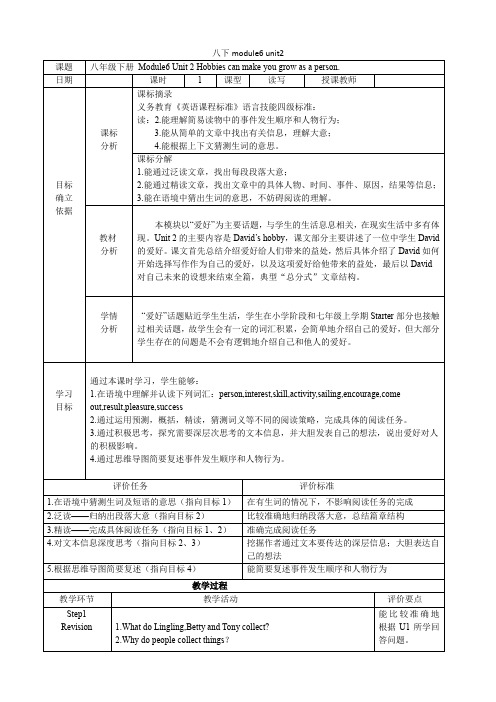
4.能在教师的帮助下或以小组讨论的方式起草和修改作文。
课标分解 1.能通过变式朗读,连贯流畅地朗读课文; 2.能通过两人对话,就“hobby” 这一话题进行交谈; 3.能运用所学语言点的和文章结构,仿写作文。
张蕊
教材 分析
本模块以“爱好”为主要话题,与学生的生活息息相关,在现实生活中多有体 现。Unit 2 的主要内容是 David’s hobby,课文部分主要讲述了一位中学生 David 的爱好。课文首先总结介绍爱好给人们带来的益处,然后具体介绍了 David 如何 开始选择写作作为自己的爱好,以及这项爱好给他带来的益处,最后以 David 对自己未来的设想来结束全篇,典型“总分式”的文章结构。
能大胆发表自 己的观点。
In 2010
He spent four weeks at a ____.There was a writing class.
His teacher______ him to write about their experiences at the camp.
Step6
Back at school
hard work
experience future plan
Step10
How to develop our hobbies?
Show a video
Homework
1. Read aloud the new words and phrases. 2. Read aloud the passage. 3. Share your hobbies with your classmates.
学情 分析
“爱好”话题贴近学生生活,学生在小学阶段和七年级上学期 Starter 部分也 接触过相关话题,故学生会有一定的词汇积累,会简单地介绍自己的爱好,但 部分学生存在的问题是不会有逻辑地介绍自己和他人的爱好。
小学英语精讲精析 Activities (2)

Does Amy ________ swimming? A. goes B. go
【答案】B 【解析】Amy 是第三人称,但是当表示疑问的时候助动词 does 提前,动词用原型。
即时体验
1.Lingling ________ TV and _________ football. A. watch, plays B. watches,plays 2.What ________ they do at the weekend? A. do B. does
B .in the afternoon at eight o’clock
C .at the afternoon in eight o’clock
( )2.Do you play football in the morning ?
.Байду номын сангаас
A .No ,I do
B .Yes , I does C .No ,I don’t ( )3.Does Xiaoyong like basketball ?
at school ?I
English and Chinese
C.have ,have
( )4.What`s the time ?It`s A. half past seven
B.seven past half C. seven o`clock half
( )5.At the weekend I swimming ,And he
TV
A. goes watches
B. go watch
C. go watches 二、连词成句,注意大小写及标点符号。
6.gets, six, o’clock, up, she ,at
外研版(三起)-英语-三年级下册--Module 6 Unit 2 What does Lingling have at school- 教案
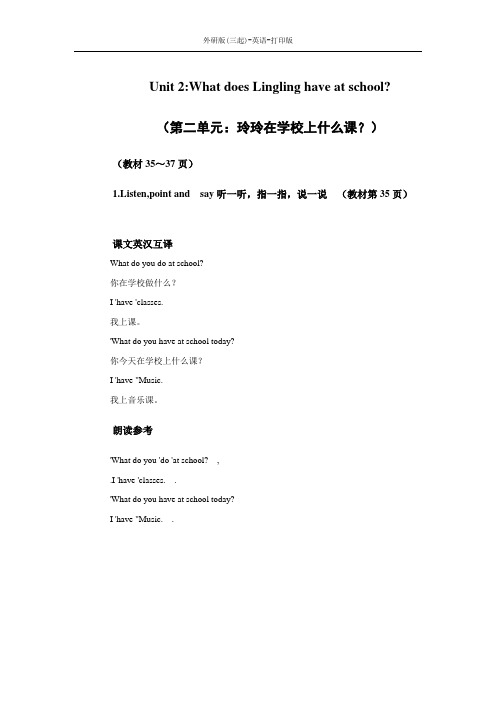
Unit 2:What does Lingling have at school?(第二单元:玲玲在学校上什么课?)(教材35~37页)1.Listen,point and say听一听,指一指,说一说(教材第35页)课文英汉互译What do you do at school?你在学校做什么?I 'have 'classes.我上课。
'What do you have at school today?你今天在学校上什么课?I 'have "Music.我上音乐课。
朗读参考'What do you 'do 'at school? ,.I 'have 'classes. .'What do you have at school today?I 'have "Music. .新词速记1.have/haev/v.(动词)上(……课),有短语:have classes上课have lunch吃午饭例句:I have Chinese,English and PE in the morning.上午我上语文、英语和体育课。
Do you have something to eat?你有什么可以吃的东西吗?拓展:have的第三人称单数形式为has2.today/t'de/adv.(副词)在今天:n(名词)今天短语:today's life今天的生活例句:They want to go to the zoo today.今天他们想去动物园。
What do you have at school today?你今天在学校上什么课?拓展:yesterday昨天,tomorrow明天3.music/‘mju:z k/n.(名词)音乐短语:listen to music听音乐music room音乐室例句:Tom likes music.汤姆喜欢音乐。
外研版八年级下册英语m6课文翻译

外研版⼋年级下册英语m6课⽂翻译 随着世界各国⽂化交流的加强,掌握英语课⽂翻译是⼋年级学⽣们的重要学习任务,下⾯⼩编给⼤家分享⼀些外研版⼋年级下册英语m6的课⽂翻译,⼤家快来跟⼩编⼀起欣赏吧。
外研版⼋年级下册英语m6课⽂翻译(⼀) Module6 Unit1 1Listen and find out who collects the things in...部分翻译 Tony 托尼 Tony's dad 托尼的爸爸 Tony's mum 托尼的妈妈 2Answer the e the words and expression in...部分翻译 collect 收集 fan扇⼦ postcard明信⽚ stamp邮票 ticket 票 tidy up 使整齐;使整洁 toy玩具 1 What does Tony's mum want him to do? 托尼的妈妈想让他做什么? 2 Which hobby does Tony think is expensive? 托尼认为哪⼀种爱好花费多? 3 Which holoby do you think takes up the most space? 你认为哪种爱好占⽤最多的空间? Now listen again and check. 现在再听⼀遍录⾳并检查(答案)。
3Listen and read.部分翻译 Lingling:Hi,everyone! Come in and find somewhere to sit down.Sorry,it's a bit of a mess.I'll put the fans on the shelf. 玲玲:嗨,⼤家好!进来找地⽅坐下。
不好意思,(家⾥)有点乱。
我来把这些扇⼦放到架⼦上。
Betty:Let me have a look.You've got so many fans. 贝蒂:让我看⼀看。
外研小学英语三起点三年级下册-Module-6-大单元集体备课整体教学设计
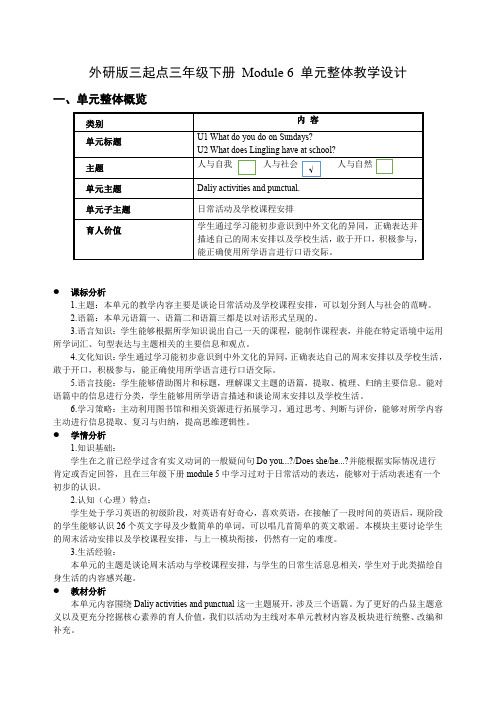
外研版三起点三年级下册Module 6 单元整体教学设计一、单元整体概览●课标分析1.主题:本单元的教学内容主要是谈论日常活动及学校课程安排,可以划分到人与社会的范畴。
2.语篇:本单元语篇一、语篇二和语篇三都是以对话形式呈现的。
3.语言知识:学生能够根据所学知识说出自己一天的课程,能制作课程表,并能在特定语境中运用所学词汇、句型表达与主题相关的主要信息和观点。
4.文化知识:学生通过学习能初步意识到中外文化的异同,正确表达自己的周末安排以及学校生活,敢于开口,积极参与,能正确使用所学语言进行口语交际。
5.语言技能:学生能够借助图片和标题,理解课文主题的语篇,提取、梳理、归纳主要信息。
能对语篇中的信息进行分类,学生能够用所学语言描述和谈论周末安排以及学校生活。
6.学习策略:主动利用图书馆和相关资源进行拓展学习,通过思考、判断与评价,能够对所学内容主动进行信息提取、复习与归纳,提高思维逻辑性。
●学情分析1.知识基础:学生在之前已经学过含有实义动词的一般疑问句Do you...?/Does she/he...?并能根据实际情况进行肯定或否定回答,且在三年级下册module 5中学习过对于日常活动的表达,能够对于活动表述有一个初步的认识。
2.认知(心理)特点:学生处于学习英语的初级阶段,对英语有好奇心,喜欢英语,在接触了一段时间的英语后,现阶段的学生能够认识26个英文字母及少数简单的单词,可以唱几首简单的英文歌谣。
本模块主要讨论学生的周末活动安排以及学校课程安排,与上一模块衔接,仍然有一定的难度。
3.生活经验:本单元的主题是谈论周末活动与学校课程安排,与学生的日常生活息息相关,学生对于此类描绘自身生活的内容感兴趣。
●教材分析本单元内容围绕Daliy activities and punctual这一主题展开,涉及三个语篇。
为了更好的凸显主题意义以及更充分挖掘核心素养的育人价值,我们以活动为主线对本单元教材内容及板块进行统整、改编和补充。
小学英语三到六年级知识点整合

三年级上册重点知识点复习Module 1Unit 1 I’m Sam.我是山姆。
Unit 2 How are you? 你好吗?一、重点短语:1. goodbye再见2.good morning 早上好二、重点句子:1. I am ...= I’m... 我是...2. How are you? 你好吗?3. I’m fine, thank you.我很好,谢谢。
Module 2Unit 1 I’m Ms Smart.我叫斯马特.Unit 2 What’s your name?你叫什么名字?一、重点短语good afternoon 下午好二、重点句子1. I’m fine. And how are you?我很好。
你呢?2. I’m fine too. Thank you.我也很好。
谢谢。
3. What’s your name? = Your name, please?你叫什么名字?I’m … / …我叫……4. W hat’s ...? = What is...? 是什么?Module 3Unit 1 Point to the door. (请)指向门。
Unit 2 Ponit to the desk. (请)指向桌子。
一、重点短语1. point to指向2. sit down 坐下3. stand up起立4. boys and girls 男孩女孩们二、重点句子1. Sit down, please!请坐下!2. Please stand up!请起立!3. Point to the door.指向门。
Module 4Unit 1 It’s red.它是红色的。
Unit 2 It’s a black dog.它是一只黑色的狗。
一、重点短语red cat 红色的猫blue cat 蓝色的猫green cat 绿色的猫black cat 黑色的猫yellow cap 黄色的帽子二、重点句子1.My name is Panpan. I’m a panda. 我叫盼盼。
外研版小学英语三年级第二册Module6Unit2教材内容全解
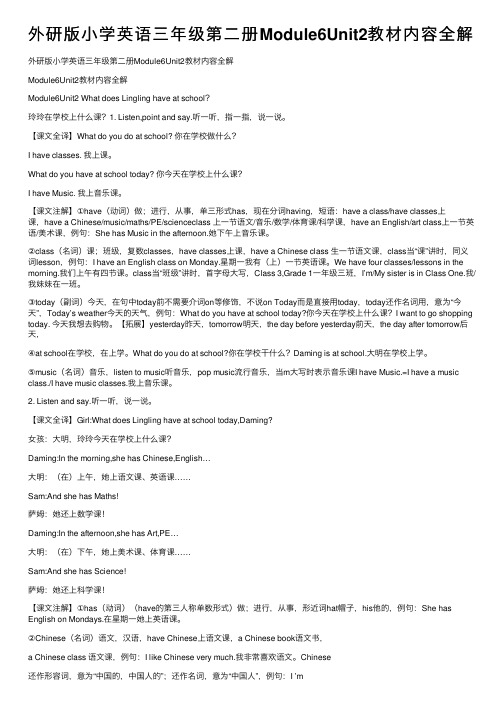
外研版⼩学英语三年级第⼆册Module6Unit2教材内容全解外研版⼩学英语三年级第⼆册Module6Unit2教材内容全解Module6Unit2教材内容全解Module6Unit2 What does Lingling have at school?玲玲在学校上什么课?1. Listen,point and say.听⼀听,指⼀指,说⼀说。
【课⽂全译】What do you do at school? 你在学校做什么?I have classes. 我上课。
What do you have at school today? 你今天在学校上什么课?I have Music. 我上⾳乐课。
【课⽂注解】①have(动词)做;进⾏,从事,单三形式has,现在分词having,短语:have a class/have classes上课,have a Chinese/music/maths/PE/scienceclass 上⼀节语⽂/⾳乐/数学/体育课/科学课,have an English/art class上⼀节英语/美术课,例句:She has Music in the afternoon.她下午上⾳乐课。
②class(名词)课;班级,复数classes,have classes上课,have a Chinese class ⽣⼀节语⽂课,class当“课”讲时,同义词lesson,例句:I have an English class on Monday.星期⼀我有(上)⼀节英语课。
We have four classes/lessons in the morning.我们上午有四节课。
class当“班级”讲时,⾸字母⼤写,Class 3,Grade 1⼀年级三班,I’m/My sister is in Class One.我/我妹妹在⼀班。
③today(副词)今天,在句中today前不需要介词on等修饰,不说on Today⽽是直接⽤today,today还作名词⽤,意为“今天”,Today’s weather今天的天⽓,例句:What do you have at school today?你今天在学校上什么课?I want to go shopping today. 今天我想去购物。
Module_6_Unit_2___What_does_Lingling_have_at_school

Unit 2 What does Lingling have at school?教学目标:1. 单词:today, music, Chinese, maths, art,science, PE, has2. 句子:What does Lingling have at school ? She has …3.学习歌曲We like school.教学重点:1.单词:today, music, Chinese, maths, art,science, PE, has2.句子:What does Lingling have at school ? She has …教学难点:主语第一人称及第三人称时,动词使用上发生的变化。
教学过程:1.热身复习(1)英语展示角。
学生自由上台介绍自己的喜好,唱英语歌曲,通过此环节让学生尽快融入学习英语的氛围中。
(2)老师出示一本日历,打开日历到今天的日期,并强调突出星期几,随后翻阅日历到周日,在周日出现的时候老师用愉快的口吻说:“It’s Sunday.. I like Sunday very much. I play basketball on Sunday. What do you do on Sunday?”引导学生运用“I...on Sunday.”的句型回答问题。
并出示打乒乓球和踢足球的图片。
最后学生两人一组进行操练。
(3)再出示另外的六幅图片,(游泳,打乒乓球,看电视等)让学生在小组内进一步练习巩固句型:What do you do on Sunday? I...on Sunday. 并在班内展示,师生要给出适当的评价。
2.课文学习(1)通过实物与图片的结合来学习有关科目的单词。
利用小游戏“猜猜看”来巩固所学单词,为学习课文做好铺垫。
老师边出示图片边说:“What’s this? ”学生回答:“It’s a book.”师补充:“Yes. It’s an English book.”以此来学习其他科目的单词(music, Chinese, maths , art, science, PE)等。
